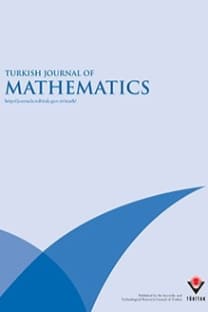Generating finite Coxeter groups with elements of the same order
Generating finite Coxeter groups with elements of the same order
Supposing G is a group and k a natural number, dk(G) is defined to be the minimal number of elements of G of order k which generate G (setting dk(G) = 0 if G has no such generating sets). This paper investigates dk(G) when G is a finite Coxeter group either of type Bn or Dn , or of exceptional type. Together with the work of Garzoni and Yu, this determines dk(G) for all finite irreducible Coxeter groups G when 2 ≤ k ≤ rank(G) (rank(G)+1 when G is of type An ).
___
- [1] Annin S, Maglione J. Economical generating sets for the symmetric and alternating groups consisting of cycles of a fixed length. Journal of Algebra and its Applications 2012; 11 (6): 8.
- [2] Bosma W, Cannon J, Playoust C. The Magma algebra system. I. The user language. Journal of Symbolic Computation 1997; 24: 235-265.
- [3] Garzoni D. Generating alternating and symmetric groups with two elements of fixed order. arXiv:1802.06213
- [4] Humphreys JE. Reflection groups and Coxeter groups. Cambridge Studies in Advanced Mathematics, 29. Cambridge University Press, Cambridge, UK, 1990.
- [5] Jones G. Primitive permutation groups containing a cycle. Bulletin of the Australian Mathematical Society 2014; 89 (1): 159-165.
- [6] Jordan C. Traité des substitutions et des équations algébriques. Gauthier-Villars 1870 (in French).
- [7] Lanier J. Generating mapping class groups with elements of fixed finite order. Journal of Algebra 2018; 511: 455-470.
- [8] Miller GA. On the groups generated by two operators. Bulletin of the American Mathematical Society 1901; 7 (10): 424-426.
- [9] Miller GA. Possible orders of two generators of the alternating and of the symmetric group. Transactions of the American Mathematical Society 1928; 30 (1): 24-32.
- [10] Yu RWT. On the generation of Coxeter groups and their alternating subgroups by involutions. Journal of Group Theory 2019; 22: 1001-1013.
- ISSN: 1300-0098
- Yayın Aralığı: Yılda 6 Sayı
- Yayıncı: TÜBİTAK
Sayıdaki Diğer Makaleler
A semisymmetric metric connection on almost contact B−metric manifolds
Coşkun YAKAR, Betül ÖZBAY ELİBÜYÜK
On fractional p-Laplacian type equations with general nonlinearities
Adel DAOUAS, Mohamed LOUCHAICH
Axes in non-associative algebras
Nonsingular cubic surfaces over F2k
Generating finite Coxeter groups with elements of the same order
Veronica KELSEY, Sarah HART, Peter ROWLEY
Linear stability of periodic standing waves of the KGZ system
Fatih HUNUTLU, Sevdzhan Ahmedov HAKKAEV
Higher cohomologies for presheaves of commutative monoids
Pilar CARRASCO, Antonio M. CEGARRA
A third-order p-laplacian boundary value problem on an unbounded domain
